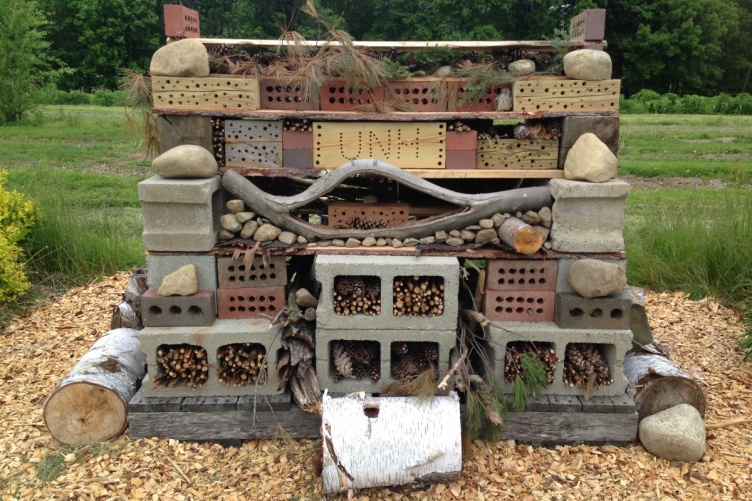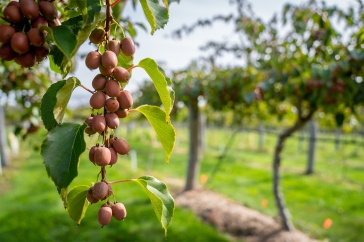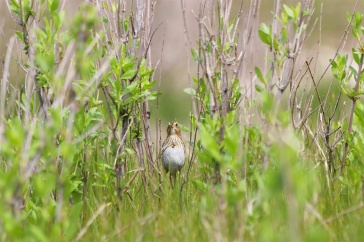
Just in time for the summer tourist season in New Hampshire, NH Agricultural Experiment Station (NHAES) researchers at the University of New Hampshire College of Life Sciences and Agriculture (COLSA) have put the final touches on a new hotel at the experiment station’s Woodman Farm.
But this hotel isn’t open to the public, unless you have the ability to pollinate. NHAES researcher Sandra Rehan, assistant professor of biological sciences; UNH Cooperative Extension specialist Cathy Neal, extension professor of plant biology; and Woodman Farm staff have constructed a bee hotel as part of the research project “Sustainable Solutions to Problems Affecting Bee Health” that will assess for the first time the Granite State’s bee species. The launch of the research project comes just in time for National Pollinator Week June 16-24, 2014, which highlights the urgent issue of declining pollinator populations.
“This study will establish the first complete diversity assessment of native bees in the region and also provide a better understanding of pollinator diversity and ecology. This information will be used to protect native bees in New England and to raise awareness of pollinator health and how human land use practices effect native pollinators and, in turn, our food supply and ecosystems,” says Rehan, the lead NHAES researcher.
Researchers hope the study will help local bee populations, and restore and rejuvenate healthy plant pollinator habitats. Rehan estimates New Hampshire has about 250 bee species. “Basic data on species diversity and habitat preferences will be fundamental to future studies to ameliorate declining bee populations and to target species at risk,” she says.
According to Rehan, the research is important because bees are critical to food crops and natural ecosystems. In fact, the value of pollination to agriculture is estimated at more than $200 billion a year worldwide. However, the abundance and diversity of bees are declining in many areas across the United States, including New England due to a number of factors, including a loss of habitat and agricultural environments, and the societal use of pesticides and chemicals. Given this importance, widespread declines in bee diversity have led to concern about a global pollinator crisis.
Rehan and her team have launched a long-term monitoring of bee biodiversity in New Hampshire, with the first monitoring sites at the Woodman and Kingman farms, both NHAES facilities. “By documenting what species are abundant, common, and rare to the area, we can track species habitat and floral preferences. By further developing long-term monitoring, we can identify species at risk and changes in bee communities,” she says.
Jon Wraith, NHAES director and COLSA dean, expressed enthusiasm about the linked studies. “These are critically important, time-sensitive issues that face our state and regional producers, gardeners, residents, and visitors. We’re excited to support this work within our engaged research portfolio,” he says.
The researchers plan to shed light on bee species at risk of extinction or with low genetic variability that may indicate genetic issues and possible decline. Researchers will use genomic screening to identify bee species threatened with decline due to low genetic variability.
“By educating New Hampshire citizens, farmers, and policy makers about native bees and habitat preferences, we can encourage the regional and national authorities to create and maintain native bee habitats. Bee boxes, wild flowers, and unmowed pastures are but a few ways to improve healthy pollinator communities,” Rehan says.
Note: Sandra Rehan is no longer with the University of New Hampshire as of May 2019.
Founded in 1887, the NH Agricultural Experiment Station at the UNH College of Life Sciences and Agriculture is UNH’s original research center and an elemental component of New Hampshire's land-grant university heritage and mission. We steward federal and state funding to provide unbiased and objective research concerning diverse aspects of sustainable agriculture, aquaculture, forest management, and related wildlife and natural resources. We maintain the Woodman and Kingman agronomy and horticultural farms, the Macfarlane Greenhouses, the Fairchild Dairy Teaching and Research Center, and the Organic Dairy Research Farm. Additional properties also provide forage, forests and woodlands in direct support to research, teaching, and outreach.
-
Written By:
Lori Tyler Gula, PhD | NH Agricultural Experiment Station | lori.gula@unh.edu | 603-862-1452



















































